Nigeria's Development: Analyzing the Impact of World Bank and IMF
VerifiedAdded on 2023/06/15
|11
|1666
|338
Report
AI Summary
This report examines the social, political, and economic conditions of Nigeria, an important country in Africa, focusing on the impact of support from the World Bank and the International Monetary Fund (IMF). While Nigeria faces challenges such as political instability, corruption, unemployment, and terrorism, the World Bank and IMF have implemented various plans providing financial, educational, and health-oriented support to improve these conditions. Despite these efforts, social instability persists, adversely affecting the political and economic landscapes. However, Nigeria is making strides in economic development, particularly through its oil market, showcasing a mixed picture of progress and ongoing challenges. Desklib offers similar solved assignments for students.
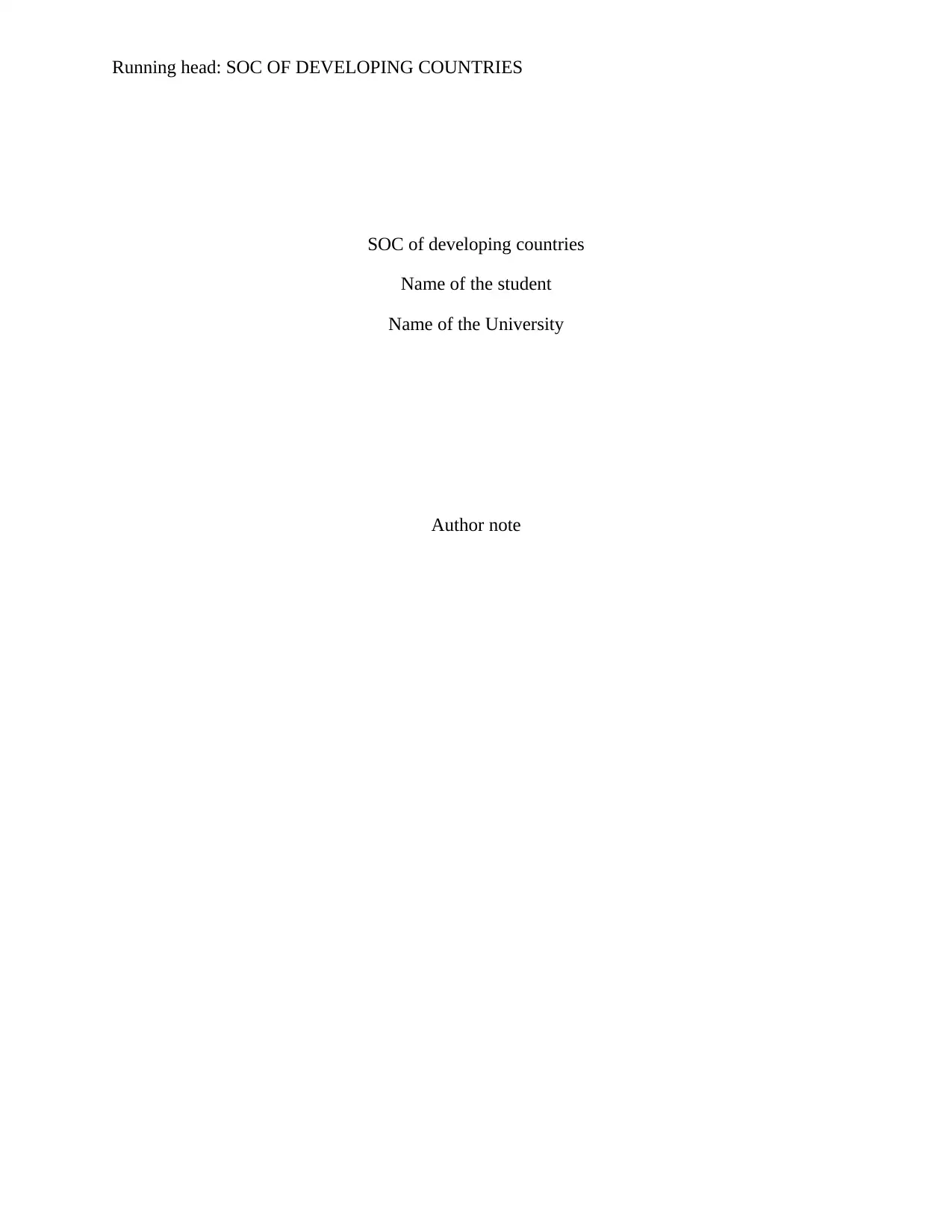
Running head: SOC OF DEVELOPING COUNTRIES
SOC of developing countries
Name of the student
Name of the University
Author note
SOC of developing countries
Name of the student
Name of the University
Author note
Paraphrase This Document
Need a fresh take? Get an instant paraphrase of this document with our AI Paraphraser
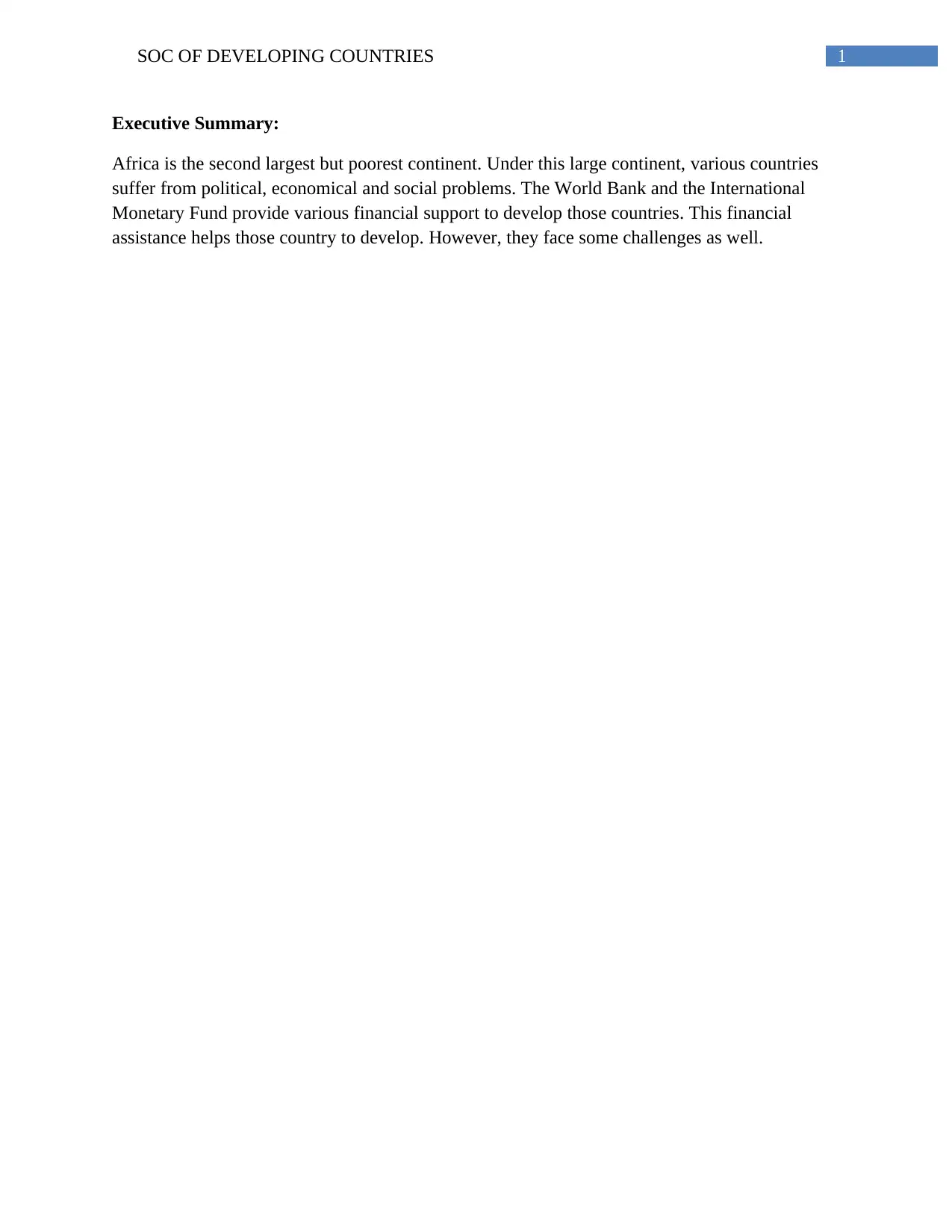
1SOC OF DEVELOPING COUNTRIES
Executive Summary:
Africa is the second largest but poorest continent. Under this large continent, various countries
suffer from political, economical and social problems. The World Bank and the International
Monetary Fund provide various financial support to develop those countries. This financial
assistance helps those country to develop. However, they face some challenges as well.
Executive Summary:
Africa is the second largest but poorest continent. Under this large continent, various countries
suffer from political, economical and social problems. The World Bank and the International
Monetary Fund provide various financial support to develop those countries. This financial
assistance helps those country to develop. However, they face some challenges as well.
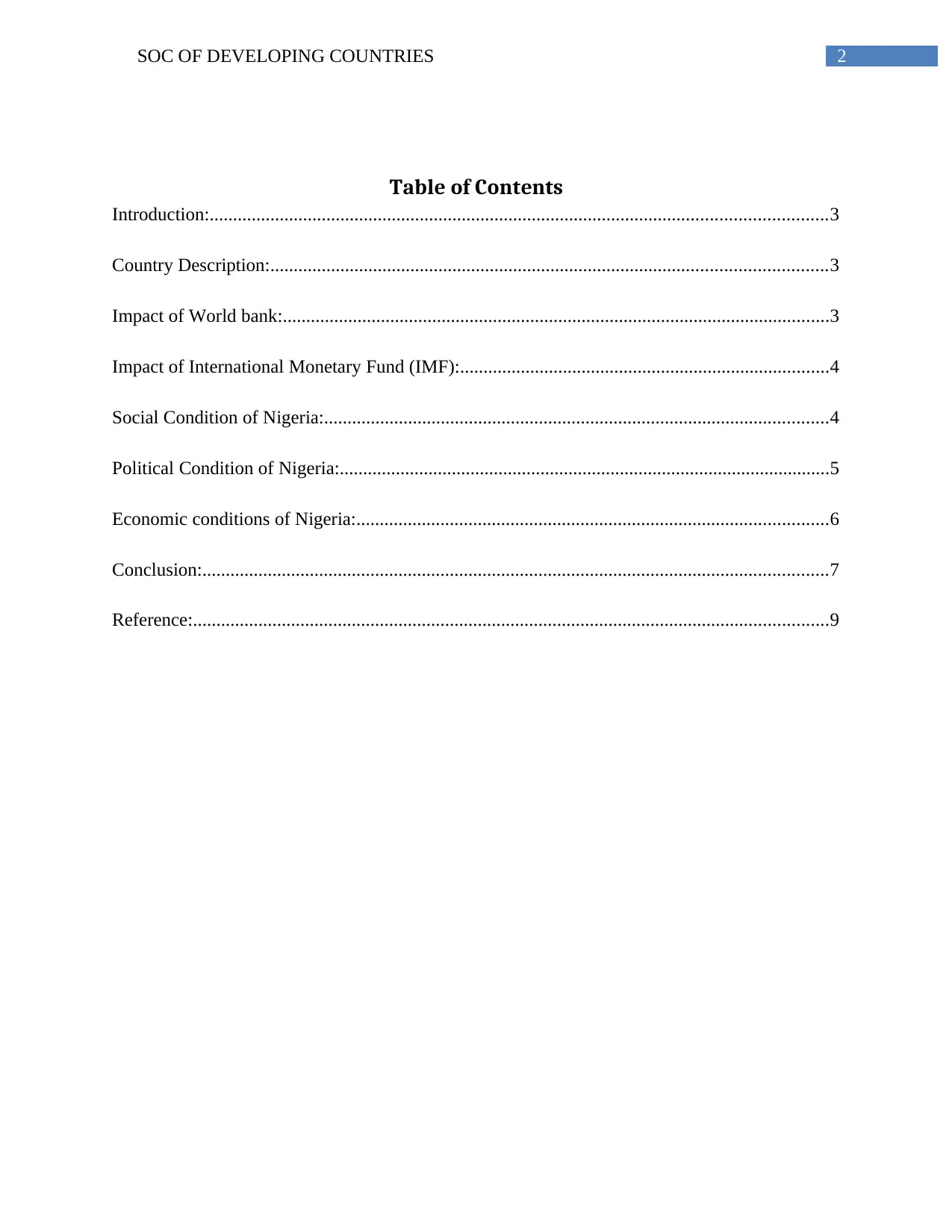
2SOC OF DEVELOPING COUNTRIES
Table of Contents
Introduction:....................................................................................................................................3
Country Description:.......................................................................................................................3
Impact of World bank:.....................................................................................................................3
Impact of International Monetary Fund (IMF):...............................................................................4
Social Condition of Nigeria:............................................................................................................4
Political Condition of Nigeria:.........................................................................................................5
Economic conditions of Nigeria:.....................................................................................................6
Conclusion:......................................................................................................................................7
Reference:........................................................................................................................................9
Table of Contents
Introduction:....................................................................................................................................3
Country Description:.......................................................................................................................3
Impact of World bank:.....................................................................................................................3
Impact of International Monetary Fund (IMF):...............................................................................4
Social Condition of Nigeria:............................................................................................................4
Political Condition of Nigeria:.........................................................................................................5
Economic conditions of Nigeria:.....................................................................................................6
Conclusion:......................................................................................................................................7
Reference:........................................................................................................................................9
⊘ This is a preview!⊘
Do you want full access?
Subscribe today to unlock all pages.

Trusted by 1+ million students worldwide
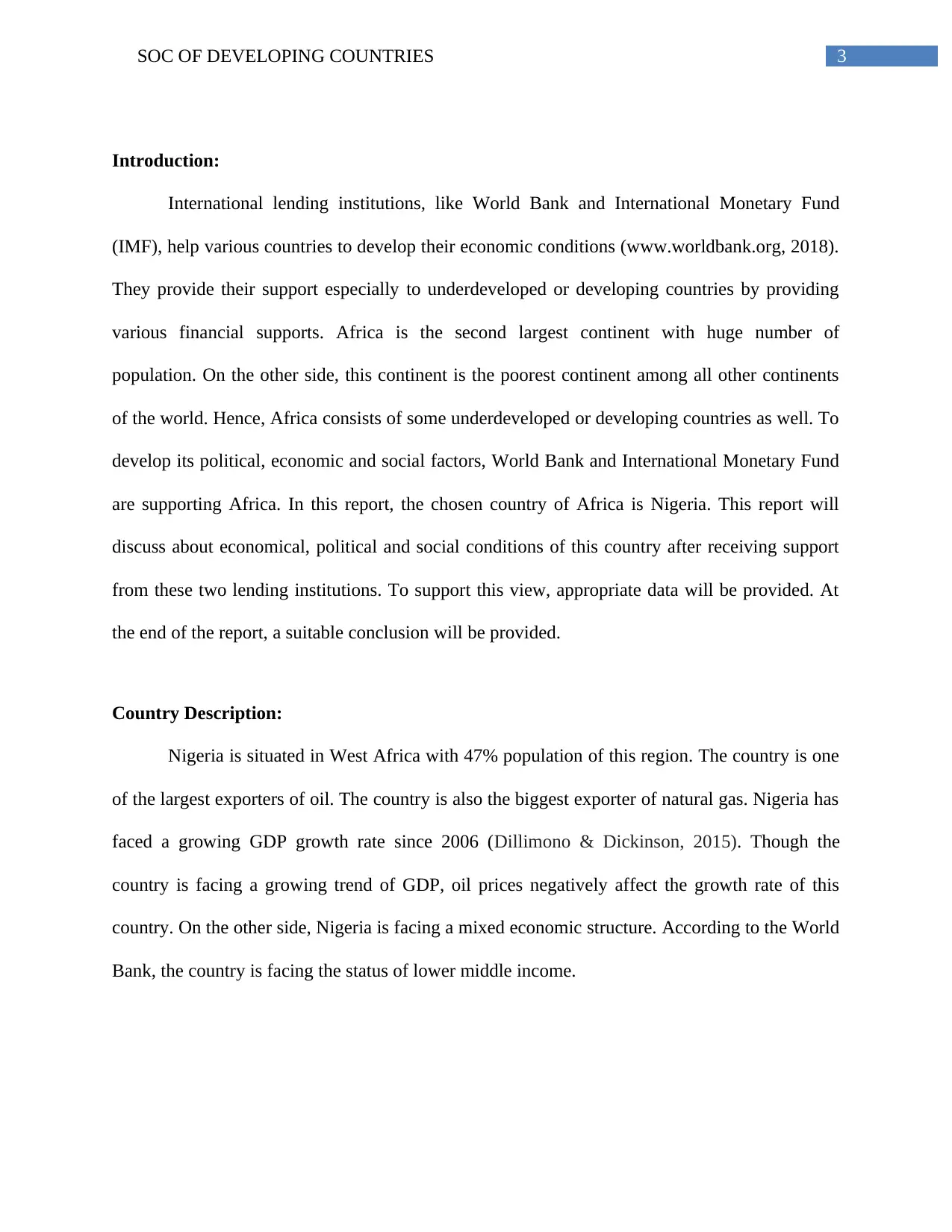
3SOC OF DEVELOPING COUNTRIES
Introduction:
International lending institutions, like World Bank and International Monetary Fund
(IMF), help various countries to develop their economic conditions (www.worldbank.org, 2018).
They provide their support especially to underdeveloped or developing countries by providing
various financial supports. Africa is the second largest continent with huge number of
population. On the other side, this continent is the poorest continent among all other continents
of the world. Hence, Africa consists of some underdeveloped or developing countries as well. To
develop its political, economic and social factors, World Bank and International Monetary Fund
are supporting Africa. In this report, the chosen country of Africa is Nigeria. This report will
discuss about economical, political and social conditions of this country after receiving support
from these two lending institutions. To support this view, appropriate data will be provided. At
the end of the report, a suitable conclusion will be provided.
Country Description:
Nigeria is situated in West Africa with 47% population of this region. The country is one
of the largest exporters of oil. The country is also the biggest exporter of natural gas. Nigeria has
faced a growing GDP growth rate since 2006 (Dillimono & Dickinson, 2015). Though the
country is facing a growing trend of GDP, oil prices negatively affect the growth rate of this
country. On the other side, Nigeria is facing a mixed economic structure. According to the World
Bank, the country is facing the status of lower middle income.
Introduction:
International lending institutions, like World Bank and International Monetary Fund
(IMF), help various countries to develop their economic conditions (www.worldbank.org, 2018).
They provide their support especially to underdeveloped or developing countries by providing
various financial supports. Africa is the second largest continent with huge number of
population. On the other side, this continent is the poorest continent among all other continents
of the world. Hence, Africa consists of some underdeveloped or developing countries as well. To
develop its political, economic and social factors, World Bank and International Monetary Fund
are supporting Africa. In this report, the chosen country of Africa is Nigeria. This report will
discuss about economical, political and social conditions of this country after receiving support
from these two lending institutions. To support this view, appropriate data will be provided. At
the end of the report, a suitable conclusion will be provided.
Country Description:
Nigeria is situated in West Africa with 47% population of this region. The country is one
of the largest exporters of oil. The country is also the biggest exporter of natural gas. Nigeria has
faced a growing GDP growth rate since 2006 (Dillimono & Dickinson, 2015). Though the
country is facing a growing trend of GDP, oil prices negatively affect the growth rate of this
country. On the other side, Nigeria is facing a mixed economic structure. According to the World
Bank, the country is facing the status of lower middle income.
Paraphrase This Document
Need a fresh take? Get an instant paraphrase of this document with our AI Paraphraser
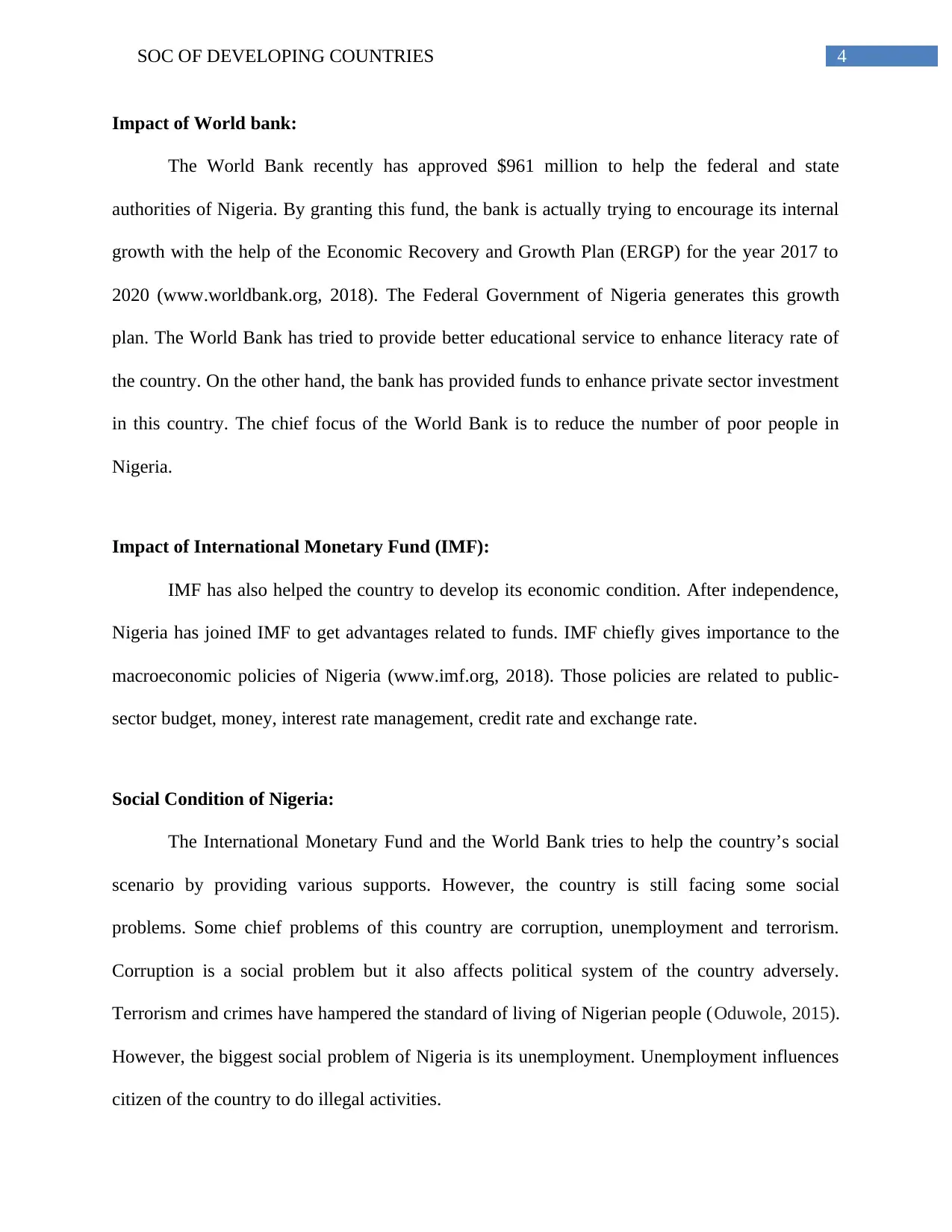
4SOC OF DEVELOPING COUNTRIES
Impact of World bank:
The World Bank recently has approved $961 million to help the federal and state
authorities of Nigeria. By granting this fund, the bank is actually trying to encourage its internal
growth with the help of the Economic Recovery and Growth Plan (ERGP) for the year 2017 to
2020 (www.worldbank.org, 2018). The Federal Government of Nigeria generates this growth
plan. The World Bank has tried to provide better educational service to enhance literacy rate of
the country. On the other hand, the bank has provided funds to enhance private sector investment
in this country. The chief focus of the World Bank is to reduce the number of poor people in
Nigeria.
Impact of International Monetary Fund (IMF):
IMF has also helped the country to develop its economic condition. After independence,
Nigeria has joined IMF to get advantages related to funds. IMF chiefly gives importance to the
macroeconomic policies of Nigeria (www.imf.org, 2018). Those policies are related to public-
sector budget, money, interest rate management, credit rate and exchange rate.
Social Condition of Nigeria:
The International Monetary Fund and the World Bank tries to help the country’s social
scenario by providing various supports. However, the country is still facing some social
problems. Some chief problems of this country are corruption, unemployment and terrorism.
Corruption is a social problem but it also affects political system of the country adversely.
Terrorism and crimes have hampered the standard of living of Nigerian people (Oduwole, 2015).
However, the biggest social problem of Nigeria is its unemployment. Unemployment influences
citizen of the country to do illegal activities.
Impact of World bank:
The World Bank recently has approved $961 million to help the federal and state
authorities of Nigeria. By granting this fund, the bank is actually trying to encourage its internal
growth with the help of the Economic Recovery and Growth Plan (ERGP) for the year 2017 to
2020 (www.worldbank.org, 2018). The Federal Government of Nigeria generates this growth
plan. The World Bank has tried to provide better educational service to enhance literacy rate of
the country. On the other hand, the bank has provided funds to enhance private sector investment
in this country. The chief focus of the World Bank is to reduce the number of poor people in
Nigeria.
Impact of International Monetary Fund (IMF):
IMF has also helped the country to develop its economic condition. After independence,
Nigeria has joined IMF to get advantages related to funds. IMF chiefly gives importance to the
macroeconomic policies of Nigeria (www.imf.org, 2018). Those policies are related to public-
sector budget, money, interest rate management, credit rate and exchange rate.
Social Condition of Nigeria:
The International Monetary Fund and the World Bank tries to help the country’s social
scenario by providing various supports. However, the country is still facing some social
problems. Some chief problems of this country are corruption, unemployment and terrorism.
Corruption is a social problem but it also affects political system of the country adversely.
Terrorism and crimes have hampered the standard of living of Nigerian people (Oduwole, 2015).
However, the biggest social problem of Nigeria is its unemployment. Unemployment influences
citizen of the country to do illegal activities.
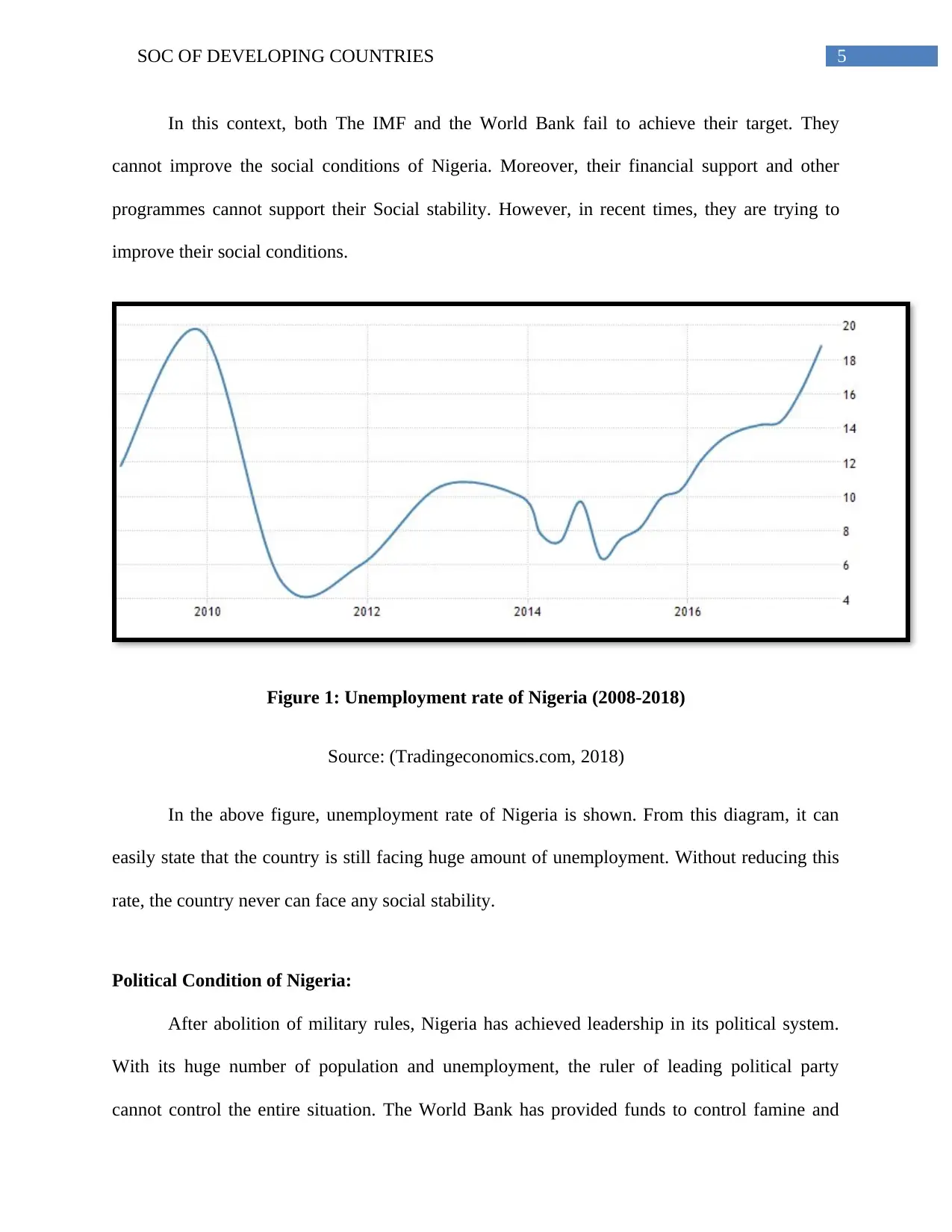
5SOC OF DEVELOPING COUNTRIES
In this context, both The IMF and the World Bank fail to achieve their target. They
cannot improve the social conditions of Nigeria. Moreover, their financial support and other
programmes cannot support their Social stability. However, in recent times, they are trying to
improve their social conditions.
Figure 1: Unemployment rate of Nigeria (2008-2018)
Source: (Tradingeconomics.com, 2018)
In the above figure, unemployment rate of Nigeria is shown. From this diagram, it can
easily state that the country is still facing huge amount of unemployment. Without reducing this
rate, the country never can face any social stability.
Political Condition of Nigeria:
After abolition of military rules, Nigeria has achieved leadership in its political system.
With its huge number of population and unemployment, the ruler of leading political party
cannot control the entire situation. The World Bank has provided funds to control famine and
In this context, both The IMF and the World Bank fail to achieve their target. They
cannot improve the social conditions of Nigeria. Moreover, their financial support and other
programmes cannot support their Social stability. However, in recent times, they are trying to
improve their social conditions.
Figure 1: Unemployment rate of Nigeria (2008-2018)
Source: (Tradingeconomics.com, 2018)
In the above figure, unemployment rate of Nigeria is shown. From this diagram, it can
easily state that the country is still facing huge amount of unemployment. Without reducing this
rate, the country never can face any social stability.
Political Condition of Nigeria:
After abolition of military rules, Nigeria has achieved leadership in its political system.
With its huge number of population and unemployment, the ruler of leading political party
cannot control the entire situation. The World Bank has provided funds to control famine and
⊘ This is a preview!⊘
Do you want full access?
Subscribe today to unlock all pages.

Trusted by 1+ million students worldwide
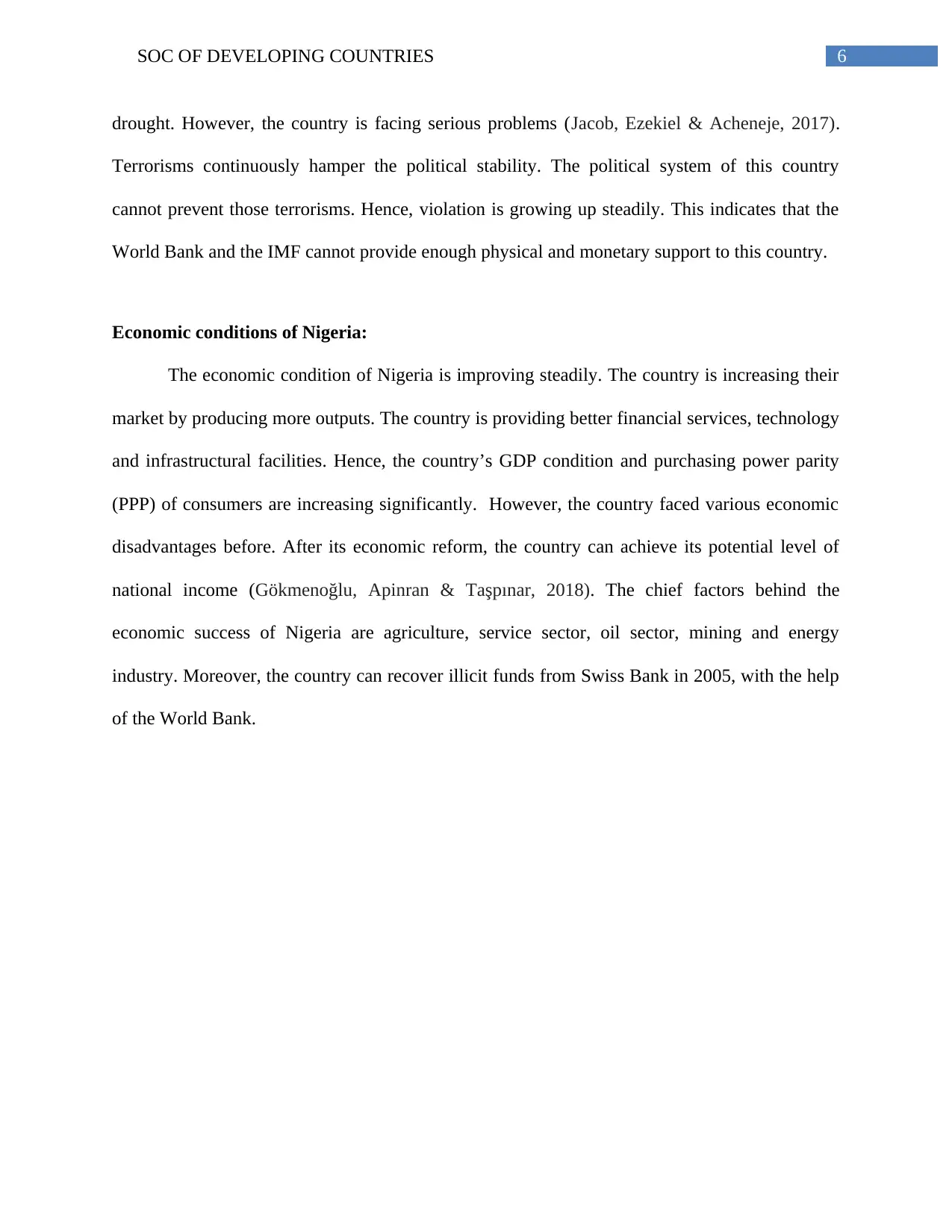
6SOC OF DEVELOPING COUNTRIES
drought. However, the country is facing serious problems (Jacob, Ezekiel & Acheneje, 2017).
Terrorisms continuously hamper the political stability. The political system of this country
cannot prevent those terrorisms. Hence, violation is growing up steadily. This indicates that the
World Bank and the IMF cannot provide enough physical and monetary support to this country.
Economic conditions of Nigeria:
The economic condition of Nigeria is improving steadily. The country is increasing their
market by producing more outputs. The country is providing better financial services, technology
and infrastructural facilities. Hence, the country’s GDP condition and purchasing power parity
(PPP) of consumers are increasing significantly. However, the country faced various economic
disadvantages before. After its economic reform, the country can achieve its potential level of
national income (Gökmenoğlu, Apinran & Taşpınar, 2018). The chief factors behind the
economic success of Nigeria are agriculture, service sector, oil sector, mining and energy
industry. Moreover, the country can recover illicit funds from Swiss Bank in 2005, with the help
of the World Bank.
drought. However, the country is facing serious problems (Jacob, Ezekiel & Acheneje, 2017).
Terrorisms continuously hamper the political stability. The political system of this country
cannot prevent those terrorisms. Hence, violation is growing up steadily. This indicates that the
World Bank and the IMF cannot provide enough physical and monetary support to this country.
Economic conditions of Nigeria:
The economic condition of Nigeria is improving steadily. The country is increasing their
market by producing more outputs. The country is providing better financial services, technology
and infrastructural facilities. Hence, the country’s GDP condition and purchasing power parity
(PPP) of consumers are increasing significantly. However, the country faced various economic
disadvantages before. After its economic reform, the country can achieve its potential level of
national income (Gökmenoğlu, Apinran & Taşpınar, 2018). The chief factors behind the
economic success of Nigeria are agriculture, service sector, oil sector, mining and energy
industry. Moreover, the country can recover illicit funds from Swiss Bank in 2005, with the help
of the World Bank.
Paraphrase This Document
Need a fresh take? Get an instant paraphrase of this document with our AI Paraphraser
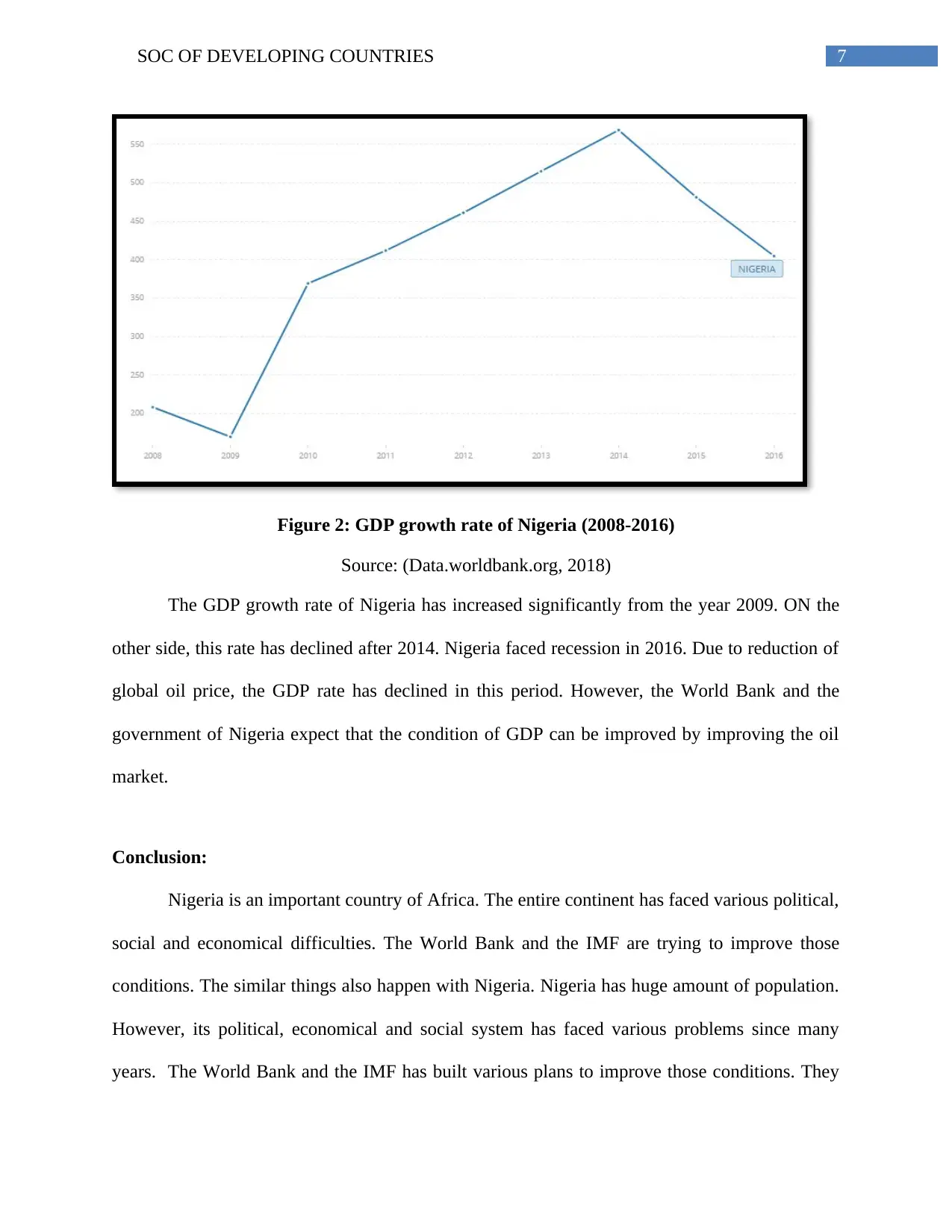
7SOC OF DEVELOPING COUNTRIES
Figure 2: GDP growth rate of Nigeria (2008-2016)
Source: (Data.worldbank.org, 2018)
The GDP growth rate of Nigeria has increased significantly from the year 2009. ON the
other side, this rate has declined after 2014. Nigeria faced recession in 2016. Due to reduction of
global oil price, the GDP rate has declined in this period. However, the World Bank and the
government of Nigeria expect that the condition of GDP can be improved by improving the oil
market.
Conclusion:
Nigeria is an important country of Africa. The entire continent has faced various political,
social and economical difficulties. The World Bank and the IMF are trying to improve those
conditions. The similar things also happen with Nigeria. Nigeria has huge amount of population.
However, its political, economical and social system has faced various problems since many
years. The World Bank and the IMF has built various plans to improve those conditions. They
Figure 2: GDP growth rate of Nigeria (2008-2016)
Source: (Data.worldbank.org, 2018)
The GDP growth rate of Nigeria has increased significantly from the year 2009. ON the
other side, this rate has declined after 2014. Nigeria faced recession in 2016. Due to reduction of
global oil price, the GDP rate has declined in this period. However, the World Bank and the
government of Nigeria expect that the condition of GDP can be improved by improving the oil
market.
Conclusion:
Nigeria is an important country of Africa. The entire continent has faced various political,
social and economical difficulties. The World Bank and the IMF are trying to improve those
conditions. The similar things also happen with Nigeria. Nigeria has huge amount of population.
However, its political, economical and social system has faced various problems since many
years. The World Bank and the IMF has built various plans to improve those conditions. They
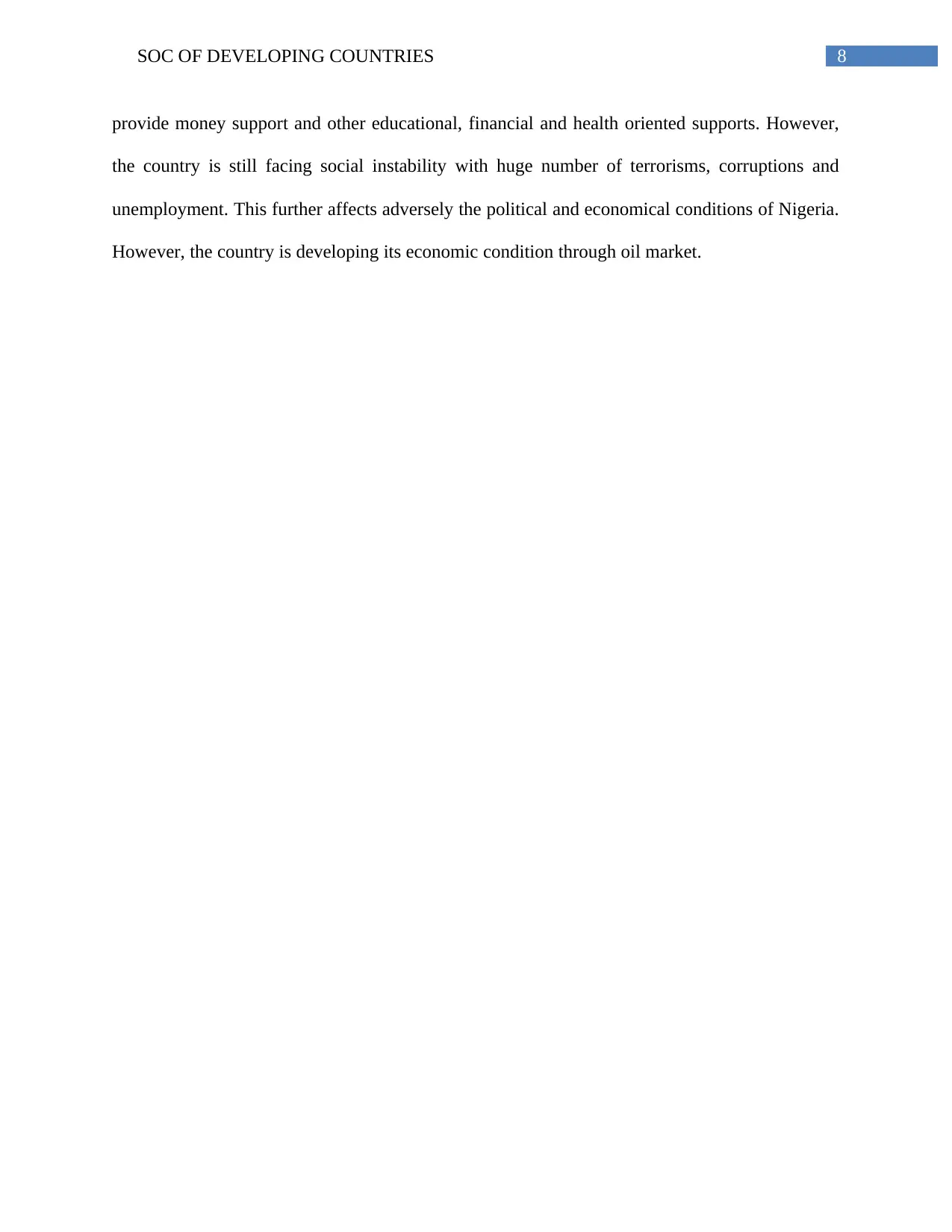
8SOC OF DEVELOPING COUNTRIES
provide money support and other educational, financial and health oriented supports. However,
the country is still facing social instability with huge number of terrorisms, corruptions and
unemployment. This further affects adversely the political and economical conditions of Nigeria.
However, the country is developing its economic condition through oil market.
provide money support and other educational, financial and health oriented supports. However,
the country is still facing social instability with huge number of terrorisms, corruptions and
unemployment. This further affects adversely the political and economical conditions of Nigeria.
However, the country is developing its economic condition through oil market.
⊘ This is a preview!⊘
Do you want full access?
Subscribe today to unlock all pages.

Trusted by 1+ million students worldwide
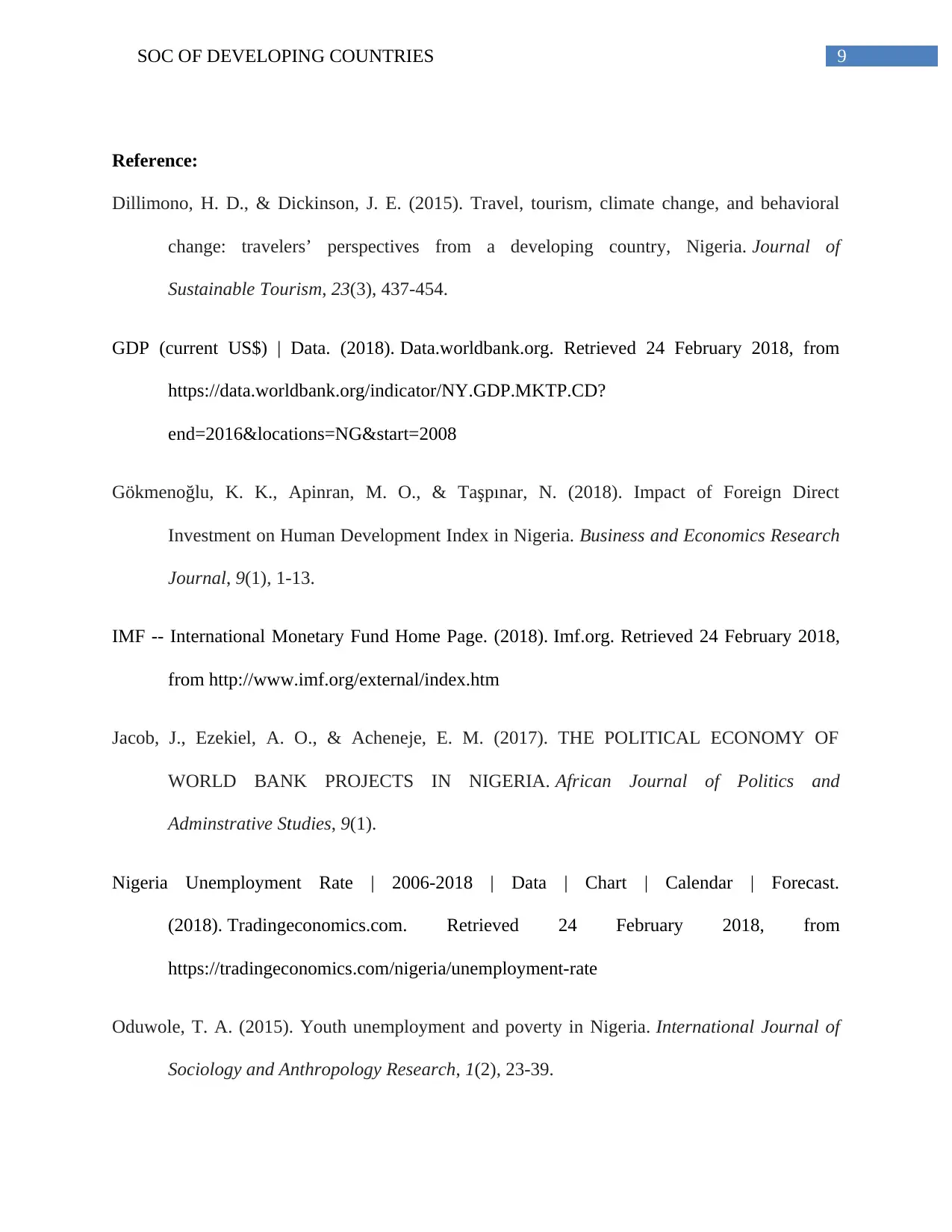
9SOC OF DEVELOPING COUNTRIES
Reference:
Dillimono, H. D., & Dickinson, J. E. (2015). Travel, tourism, climate change, and behavioral
change: travelers’ perspectives from a developing country, Nigeria. Journal of
Sustainable Tourism, 23(3), 437-454.
GDP (current US$) | Data. (2018). Data.worldbank.org. Retrieved 24 February 2018, from
https://data.worldbank.org/indicator/NY.GDP.MKTP.CD?
end=2016&locations=NG&start=2008
Gökmenoğlu, K. K., Apinran, M. O., & Taşpınar, N. (2018). Impact of Foreign Direct
Investment on Human Development Index in Nigeria. Business and Economics Research
Journal, 9(1), 1-13.
IMF -- International Monetary Fund Home Page. (2018). Imf.org. Retrieved 24 February 2018,
from http://www.imf.org/external/index.htm
Jacob, J., Ezekiel, A. O., & Acheneje, E. M. (2017). THE POLITICAL ECONOMY OF
WORLD BANK PROJECTS IN NIGERIA. African Journal of Politics and
Adminstrative Studies, 9(1).
Nigeria Unemployment Rate | 2006-2018 | Data | Chart | Calendar | Forecast.
(2018). Tradingeconomics.com. Retrieved 24 February 2018, from
https://tradingeconomics.com/nigeria/unemployment-rate
Oduwole, T. A. (2015). Youth unemployment and poverty in Nigeria. International Journal of
Sociology and Anthropology Research, 1(2), 23-39.
Reference:
Dillimono, H. D., & Dickinson, J. E. (2015). Travel, tourism, climate change, and behavioral
change: travelers’ perspectives from a developing country, Nigeria. Journal of
Sustainable Tourism, 23(3), 437-454.
GDP (current US$) | Data. (2018). Data.worldbank.org. Retrieved 24 February 2018, from
https://data.worldbank.org/indicator/NY.GDP.MKTP.CD?
end=2016&locations=NG&start=2008
Gökmenoğlu, K. K., Apinran, M. O., & Taşpınar, N. (2018). Impact of Foreign Direct
Investment on Human Development Index in Nigeria. Business and Economics Research
Journal, 9(1), 1-13.
IMF -- International Monetary Fund Home Page. (2018). Imf.org. Retrieved 24 February 2018,
from http://www.imf.org/external/index.htm
Jacob, J., Ezekiel, A. O., & Acheneje, E. M. (2017). THE POLITICAL ECONOMY OF
WORLD BANK PROJECTS IN NIGERIA. African Journal of Politics and
Adminstrative Studies, 9(1).
Nigeria Unemployment Rate | 2006-2018 | Data | Chart | Calendar | Forecast.
(2018). Tradingeconomics.com. Retrieved 24 February 2018, from
https://tradingeconomics.com/nigeria/unemployment-rate
Oduwole, T. A. (2015). Youth unemployment and poverty in Nigeria. International Journal of
Sociology and Anthropology Research, 1(2), 23-39.
Paraphrase This Document
Need a fresh take? Get an instant paraphrase of this document with our AI Paraphraser
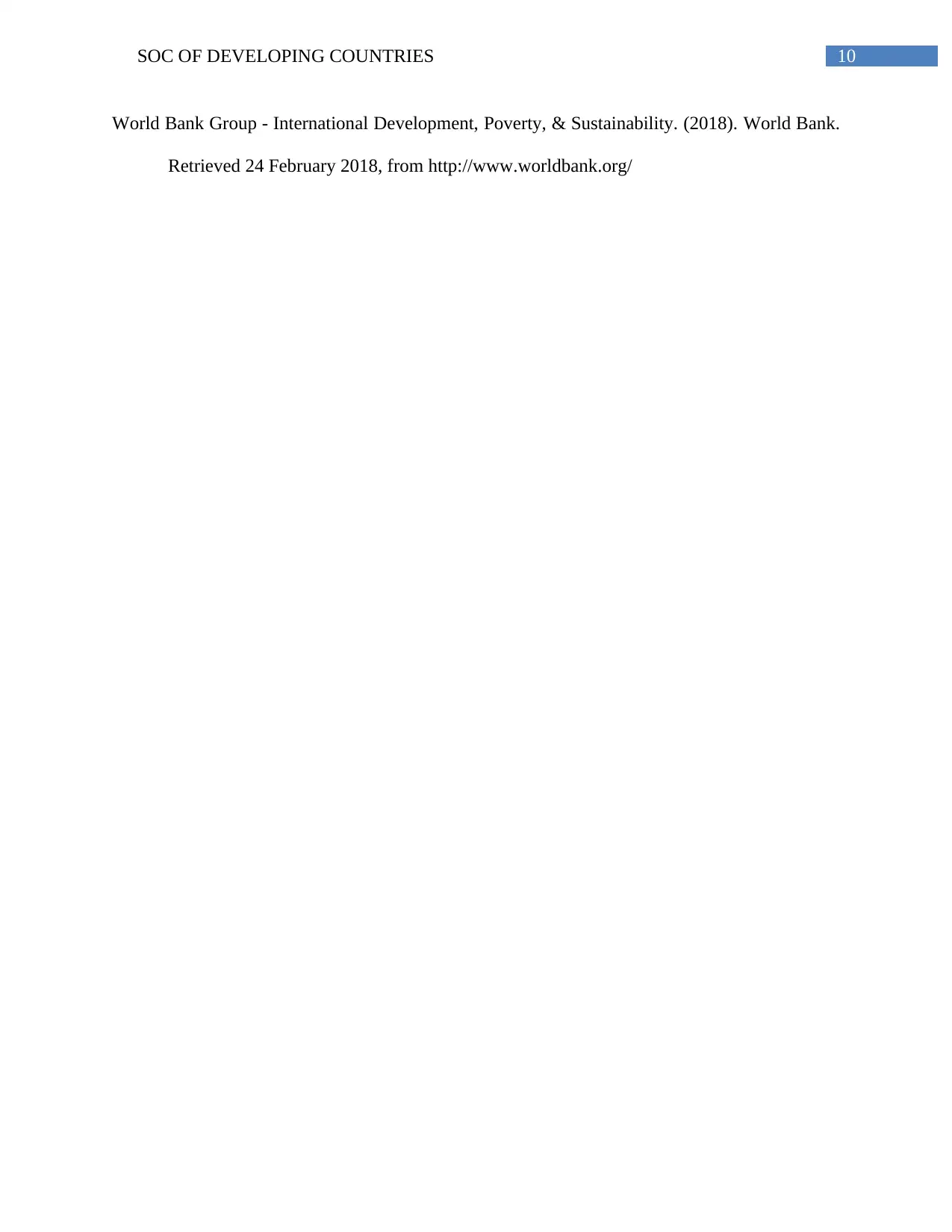
10SOC OF DEVELOPING COUNTRIES
World Bank Group - International Development, Poverty, & Sustainability. (2018). World Bank.
Retrieved 24 February 2018, from http://www.worldbank.org/
World Bank Group - International Development, Poverty, & Sustainability. (2018). World Bank.
Retrieved 24 February 2018, from http://www.worldbank.org/
1 out of 11
Related Documents
Your All-in-One AI-Powered Toolkit for Academic Success.
+13062052269
info@desklib.com
Available 24*7 on WhatsApp / Email
![[object Object]](/_next/static/media/star-bottom.7253800d.svg)
Unlock your academic potential
Copyright © 2020–2025 A2Z Services. All Rights Reserved. Developed and managed by ZUCOL.





